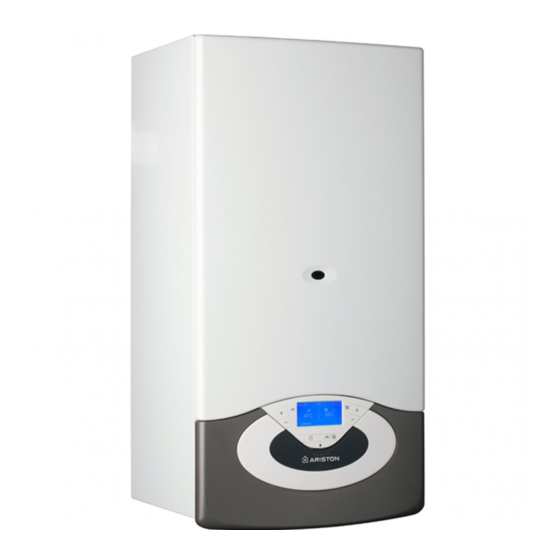Ariston genus evo 30 CF 설치 및 서비스 지침 - 페이지 24
{카테고리_이름} Ariston genus evo 30 CF에 대한 설치 및 서비스 지침을 온라인으로 검색하거나 PDF를 다운로드하세요. Ariston genus evo 30 CF 48 페이지. Wall-hung
Ariston genus evo 30 CF에 대해서도 마찬가지입니다: 사용자 설명서 (16 페이지)

messa in funzione
Funzione AUTO
Funzione che permette alla caldaia di adattare autonomamente
il proprio regime di funzionamento (temperatura degli elementi
scaldanti) alle condizioni esterne per raggiungere e mantenere le
condizioni di temperatura ambiente richieste.
A seconda delle periferiche connesse e del
numero delle zone gestite, la caldaia regola
autonomamente la temperatura di mandata.
Provvedere quindi al settaggio dei vari
parametri interessati (vedi Area tecnica).
Per attivare la funzione premere il tasto
AUTO.
Per maggiori informazioni consultare il
Manuale di Termoregolazione di ARISTON.
ESEMPIO 1:
IMPIANTO SINGOLA ZONA (ALTA TEMPERATURA) CON TERMOSTATO
AMBIENTE ON/OFF.
In questo caso è necessario impostare i seguenti parametri:
4.2.1 - Attivazione Termoregolazione tramite sensori
- selezionare 01 = Dispositivi On/Off
2.4.4 - Boost Time (opzionale)
può essere impostato il tempo di attesa per l'incremento
a step di 4°C della temperatura di mandata. Il valore varia a
seconda del tipo di impianto e di installazione.
Se il Boost Time è = 00 tale funzione non è attiva
ESEMPIO 2:
IMPIANTO SINGOLA ZONA (ALTA TEMPERATURA) CON TERMOSTATO
AMBIENTE ON/OFF + SONDA ESTERNA.
In questo caso è necessario impostare i seguenti parametri:
4.2.1 - Attivazione Termoregolazione tramite sensori
- selezionare 03 = solo sonda esterna
4.2.2 - Selezione curva termoregolazione
- selezionare la curva interessata in base al tipo di impianto, di
installazione, di isolamento termico dell'edifi cio etc..
4.2.3 - Spostamento parallelo curva se necessario, che permette di
spostare parallelamente la curva aumentando o diminuendo
la temperatura di set-point (modifi cabile anche dall'utente,
tramite la manopola di regolazione della temperatura
riscaldamento che con la funzione AUTO attivata, svolge la
funzione di spostamento parallelo della curva).
ESEMPIO 3:
IMPIANTO SINGOLA ZONA (ALTA TEMPERATURA) CON CONTROLLO
REMOTO SENSYS + SONDA ESTERNA.
In questo caso è necessario impostare i seguenti parametri:
4.2.1 - Attivazione Termoregolazione tramite sensori
- selezionare 4 = sonda esterna + sonda ambiente
4.2.2 - Selezione curva termoregolazione
- selezionare la curva interessata in base al tipo di impianto, di
installazione, di isolamento termico dell'edifi cio etc.
4.2.3 - Spostamento parallelo curva se necessario, che permette di
spostare parallelamente la curva aumentando o diminuendo
la temperatura di set-point (modifi cabile anche dall'utente
tramite l'encoder che, con la funzione AUTO attivata, svolge
la funzione di spostamento parallelo della curva)
4.2.4 - Infl uenza del sensore ambiente
- permette di regolare l'infl uenza del sensore ambiente
sul calcolo della temperatura di set-point mandata (20 =
massima
0 = minima)
24
commissioning
AUTO function
This is a function which enables the boiler to automatically adapt its
operation routine (the temperature of the heating elements) in line
with the outdoor conditions, in order to achieve and maintain the
requested room temperature conditions.
24/01/2012
15:38
auto
44°C
38°C
EXAMPLE 1:
SINGLE ZONE SYSTEM (HIGH-TEMPERATURE) WITH ON/OFF ROOM
THERMOSTAT:
In this case the following parameters must be set:
4.2.1 - Activation of temperature adjustment using sensors
- Select 04 = Basic temperature adjustment
2.4.4 - Boost Time (optional)
The wait time for the fl ow temperature increase in steps of 4°C
may be set. The value varies according to the type of system
and installation.
If the Boost Time value = 00 the function is not activated.
EXAMPLE 2:
SINGLE ZONE SYSTEM (HIGH-TEMPERATURE) WITH ON/OFF ROOM
THERMOSTAT + OUTDOOR SENSOR:
In this case the following parameters must be set:
4.2.1 - Activation of temperature adjustment using sensors
- Select 01 = outdoor sensor only
4.2.2 - Temperature adjustment curve selection
- Select the relevant curve according to the type of system,
installation, heat insulation used in the building, etc.
4.2.3 - Perform a parallel curve shift if necessary, increasing or
decreasing the set-point temperature (this may also be
modifi ed by the user, using the heating temperature
adjustment knob, which, with the AUTO function activated,
is used to shift the curve in a parallel manner).
EXAMPLE 3:
SINGLE ZONE SYSTEM (HIGH-TEMPERATURE) WITH SENSYS REMOTE
CONTROL + OUTDOOR SENSOR
In this case the following parameters must be set:
4.2.1 - Activation of temperature adjustment using sensors
- select 0 = outdoor sensor + room sensor
4.2.2 - Temperature adjustment curve selection
- Select the relevant curve according to the type of system,
installation, heat insulation used in the building, etc
4.2.3 - Perform a parallel curve shift if necessary, increasing or
decreasing the set-point temperature. (This may also be
changed by the user by the encoder which, with the AUTO
function activated, is used to shift the curve in a parallel
manner.)
4.2.4 - Infl uence of room sensor
- used to adjust the infl uence the room temperature has
on the calculation of the set-point fl ow temperature (20 =
maximum, 0 = minimum).
Depending on the peripheral units
connected and the number of zones
controlled, the boiler adjusts its fl ow
temperature automatically.
The various corresponding parameters
should therefore be set (see Technical
Area).
To activate the function, press the AUTO
button.
For further information please refer to
the ARISTON temperature adjustment
manual.
